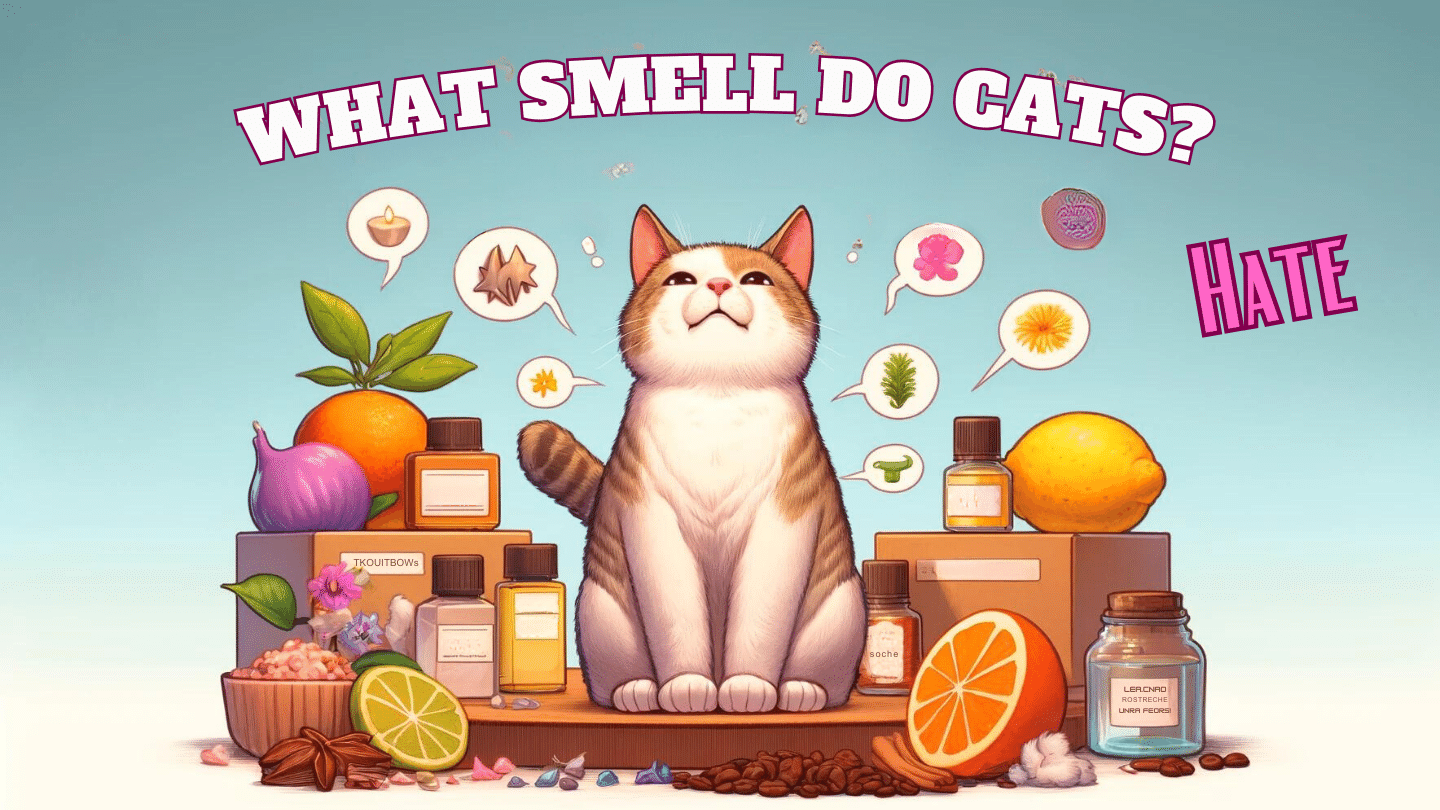This post contains affiliate links and I will be compensated if you make a purchase after clicking on my links.
The Aroma Antagonists: Exploring What Smell Do Cats Hate
It’s no secret that our whiskered companions are the epitome of pickiness, turning their noses up not just at yesterday’s tuna but at a bouquet of household scents as well.
This selective nature goes beyond their gourmet preferences to include a long list of odors that can transform your cozy abode into a landscape of aromatic landmines for your cat.
Today, we delve into something even more intriguing: a comprehensive catalog of scents that send cats into a tizzy of avoidance. Yes, we’re talking about the smells cats hate, an essential piece of the puzzle in understanding our enigmatic feline friends.
Understanding the Feline Nose
To truly appreciate the extent of a cat’s disdain for certain scents, we must first embark on a sensory journey into the feline olfactory system.
Cats possess an extraordinary sense of smell, dwarfing our human capabilities by leaps and bounds. Imagine this: while we humans navigate the world with a modest 5 to 6 million olfactory receptors, cats boast an impressive array of around 200 million.
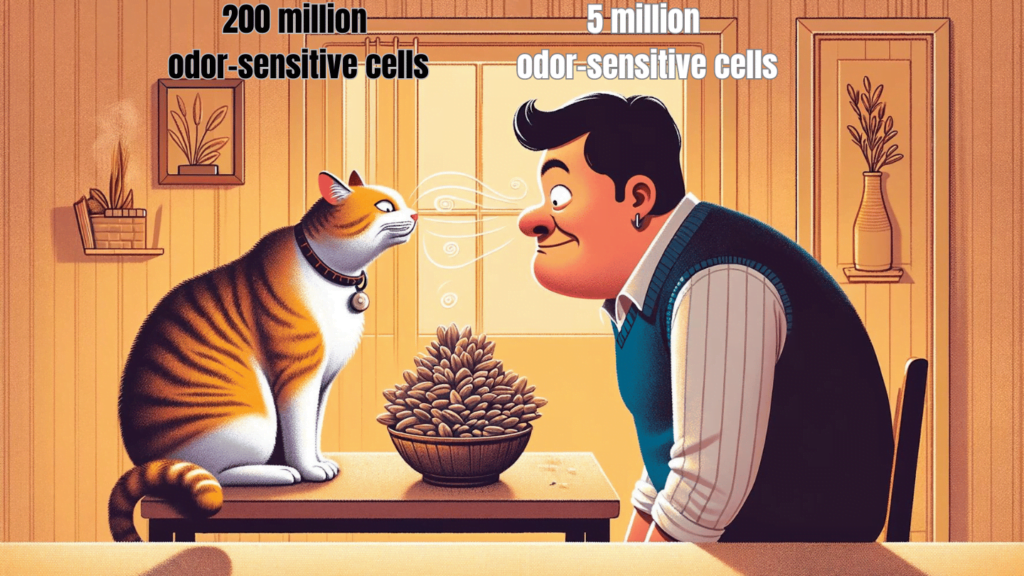
This isn’t just a numbers game; it’s the difference between living in a world of olfactory black and white and one bursting with scent-based Technicolor. This heightened sense of smell plays a critical role in a cat’s survival toolkit, aiding in everything from hunting to recognizing territory and even communicating with fellow felines through scent marks.
However, this superpower comes with its kryptonite—certain smells can trigger anything from mild distaste to outright aversion, affecting them both physically and psychologically.
Scents of Discontent: Exploring What Smell Do Cats Hate
1. Citrus Fruits (Lemons, Limes, Oranges, Grapefruits)
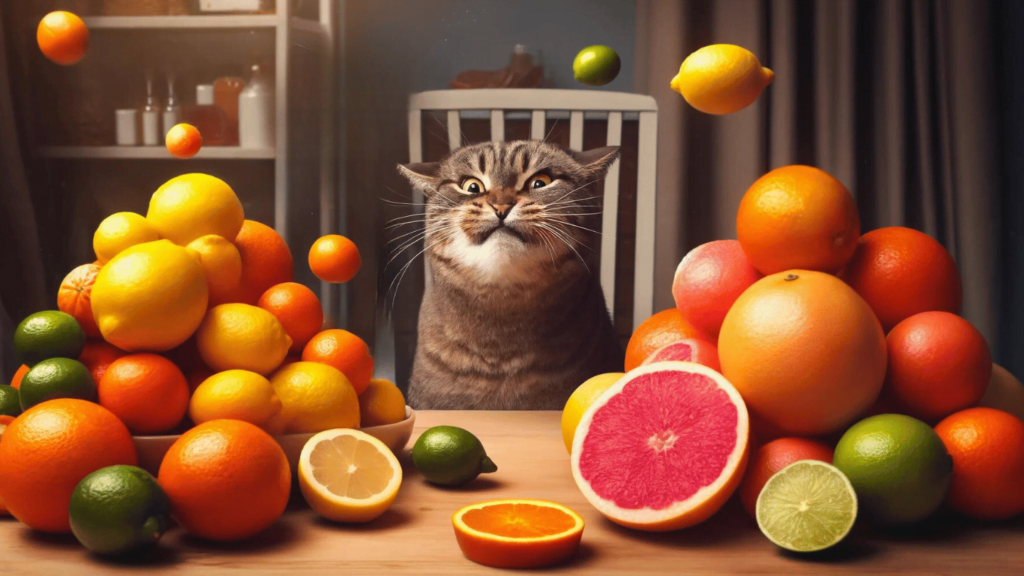
While the vibrant scent of citrus can energize and refresh human senses, it sends our feline friends scampering in the opposite direction.
Why?: The intense, sharp aroma of citrus fruits is overpowering for cats, who have a far more sensitive sense of smell than humans. Additionally, citrus oils can be irritating and potentially toxic to cats, prompting their natural instinct to avoid these scents.
2. Essential Oils (Eucalyptus, Tea Tree, Peppermint, Lavender)
Essential oils, cherished for their therapeutic benefits in humans, are often aversive and potentially harmful to cats.
Why?: Cats cannot properly metabolize the compounds in essential oils, risking toxicity. Even the scent of eucalyptus, tea tree, peppermint, lavender, and cinnamon can overwhelm cats’ sensitive noses, leading to discomfort or avoidance.
3. Vinegar
As a household cleaning agent, vinegar is unmatched in versatility and effectiveness, yet it’s not something your cat appreciates.
Why?: Its acrid smell is intensely repulsive to cats. The sharp acidity of vinegar, while excellent for cleaning and deterring cats from certain areas, can be unpleasantly overpowering for their sensitive olfactory systems.
4. Spicy Scents (Cinnamon, Clove, Pepper, Chili)

The aromas of spices may add a delightful kick to our meals, but they’re far from appetizing to our feline companions.
Why?: The strong, pungent scents of spices like cinnamon, clove, pepper, and chili are overwhelming to cats. Such intense smells are not only offensive to their noses but can also be irritating.
5. Baneful Blooms (Lilies, Chrysanthemums, Tulips)
While we might admire the beauty and fragrance of certain flowers like lilies, chrysanthemums, and tulips, they’re not as beloved by our cat friends.
Why?: Beyond their strong scents, which cats find unappealing, these plants can be toxic to cats if ingested. This natural aversion acts as a protective mechanism to keep them safe from potential harm.
6. Onions and Garlic
Onions and garlic are staples in human cuisine, known for adding depth and flavor to dishes. However, cats have a very different take on these ingredients.
Why?: The compounds in onions and garlic can be harmful to cats, causing oxidative damage to their red blood cells and leading to anemia. The strong odors also naturally repel cats, signaling them to stay away from these potentially dangerous foods.
7. Pine and Cedar
Pine and cedar are popular for their fresh, clean scents in products like cat litter and air fresheners. However, these natural aromas don’t charm our feline companions in the same way.
Why?: Cats find the aromatic oils in pine and cedar irritating. The intense, resinous scents, while refreshing to humans, can overwhelm a cat’s sensitive olfactory system, leading to avoidance or discomfort.
8. Ammonia
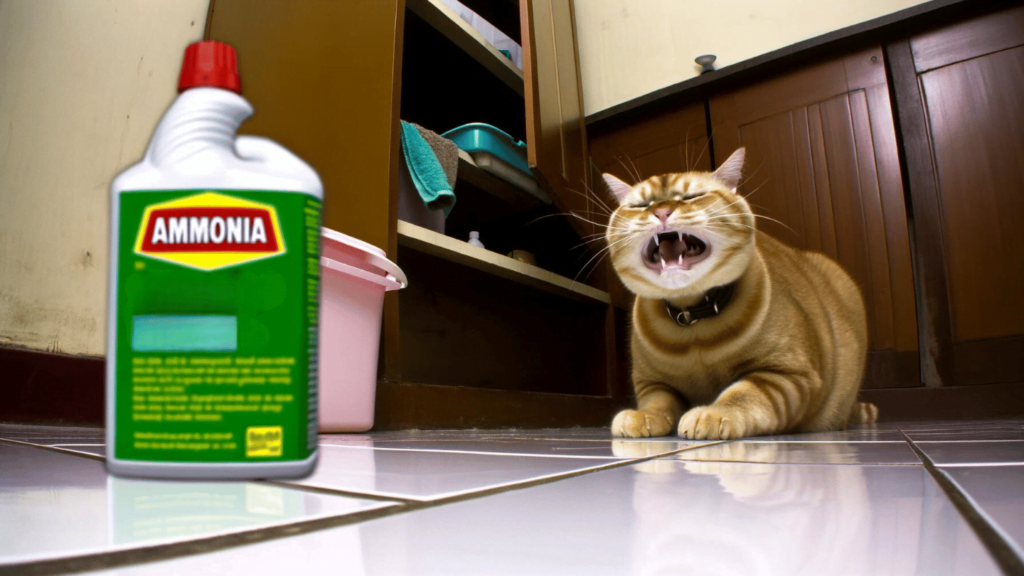
Ammonia’s potent, pungent scent is far from a feline favorite, striking their sensitive noses with an unpleasant sharpness.
Why?: Ironically, the smell of ammonia mimics the scent of urine, which can confuse cats and potentially encourage marking behavior as they try to cover up what they perceive as another animal’s scent.
9. Alcohol and Chemical Cleaners
The strong, clinical odor of rubbing alcohol and the harsh scents of many chemical cleaners do more than just sanitize our spaces; they repel our furry companions.
Why?: These pose significant health risks to cats. Their sensitive respiratory systems can easily become irritated by these potent odors, leading to discomfort or worse, toxic exposure.
10. Mothballs
Mothballs, often used to protect clothing from pests, come with a distinct, pungent smell that’s not exactly cat-friendly.
Why?: Beyond their off-putting odor, mothballs contain chemicals like naphthalene or paradichlorobenzene, which are toxic to cats if ingested or inhaled in small quantities. This risk makes mothballs a double threat: unappealing in scent and dangerous to your cat’s health.
11. Rubber and Plastic
The smells emanating from rubber and plastic items can sometimes turn a cat’s curiosity into cautious avoidance.
Why?: Some rubber and plastic materials release odors that can mimic pheromones or the scents of other animals, confusing or repelling cats. This reaction is a testament to their intricate sense of smell, capable of detecting even subtle chemical emissions we humans might not notice.
12. Coffee Grounds

The rich, aromatic world of coffee that captivates many humans has a different effect on our feline friends.
Why? While some cats may be indifferent, others find the strong, bitter scent of coffee grounds to be unpleasant. The intensity of the smell can be too much for their sensitive noses, making coffee grounds an unexpected addition to the list of scents cats prefer to avoid.
13. Bananas
To most of us, bananas are a handy, delicious snack, but in the world of cats, they’re not exactly the cat’s pajamas.
Why?: The peels of bananas release ethyl acetate among other compounds, which some cats find off-putting. This aversion is likely due to the strong, somewhat sweet and pungent smell that bananas emit, making them a curious item on the list of scents cats prefer to avoid.
14. Herbs like Rosemary (and Other Herbs)
Rosemary, along with other aromatic herbs like lavender and thyme, can add a dash of fragrance to our homes and dishes. However, these scented herbs often get a paws-down from the feline jury.
Why?: The intense aromatic oils and compounds that these herbs emit can be overpowering to cats’ sensitive olfactory systems. It’s their natural defense mechanism to steer clear of potent, potentially irritating scents.
15. Dirty Litter Box
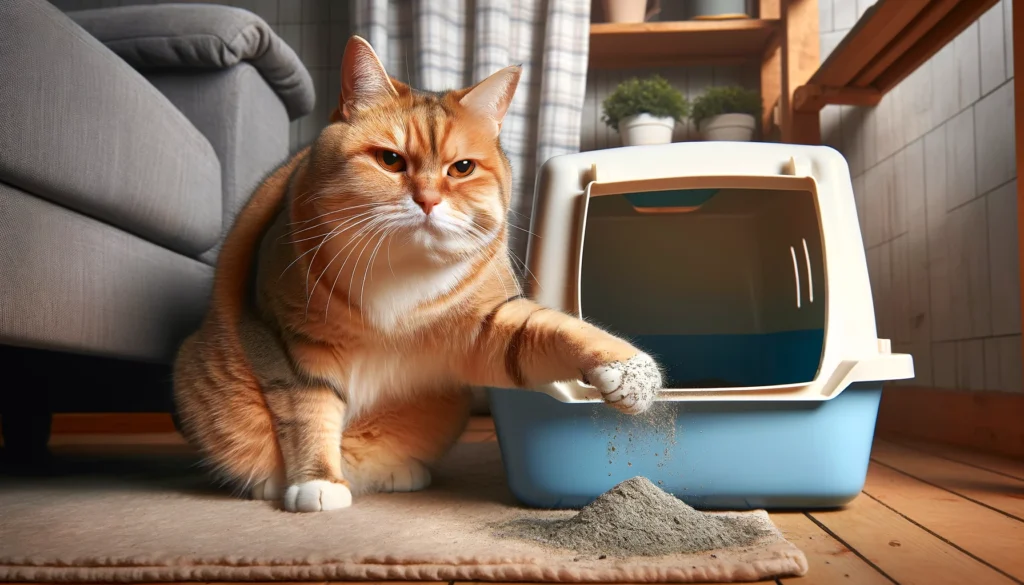
The importance of a clean litter box cannot be overstated, not just for our noses but for our cats as well.
Why?: A dirty litter box is not just a human displeasure but a major turn-off for cats too. Cats are naturally clean animals, and a soiled litter box can be distressing and unappealing, potentially leading to avoidance behaviors.
How to Keep Your Home Feline-Friendly and Fresh
Navigating the delicate dance of maintaining a clean and aromatic home without turning it into a no-fly zone for your whiskered compatriots might seem like a challenge.
However, there are some purr-proof tips to keep both your nose and your feline’s tail up in contentment:
- Opt for Natural Fresheners: Instead of reaching for heavily perfumed sprays or candles, consider natural options like baking soda for neutralizing odors. A sprinkle in the litter box or on carpets (before a thorough vacuum) can work wonders without ruffling your cat’s fur.
- Diffuse with Care: If you love diffusing essential oils, switch to cat-safe options. Dilute oils like lavender or frankincense well, and ensure the room is well-ventilated and not the cat’s favorite hangout spot.
- Incorporate Cat-Friendly Plants: Plants like cat grass or catnip can add a touch of green to your home and are utterly delightful to your cat. They purify the air, and your cat might be too busy nibbling on their favorite plant to notice anything else.
- Use Enzymatic Cleaners: For cleaning up after your feline friend, enzymatic cleaners are a lifesaver. They break down odors and stains at the molecular level, keeping your home fresh without the harsh scents of chemical cleaners.
- Maintain the Litter Box: Regularly cleaning the litter box is a surefire way to keep unpleasant smells at bay. Opt for unscented litter and scoop daily to respect your cat’s sensitive nose (and preferences).
Nose Knows Best: Respecting What Smell Do Cats Hate
In the grand tapestry of cohabitation, understanding what scents our cats detest, along with other adversities they face, serves as a guidepost in creating a harmonious environment. While we embark on aromatic escapades, let’s not forget the olfactory needs of our feline friends, ensuring a sanctuary for all. It’s about crafting a sensory journey that honors both human and cat noses.
Meet Sean, a fintech whiz with a penchant for pet purrs and blockchain buzz. After a decade of fintech feats, Sean’s tech talents leaped from ledger lines to litter lines, driven by a passion for pets and a vision for a more connected pet care community. With three critter companions as co-pilots, Sean launched this blog to share a treasury of pet-friendly tech tips and tales.

